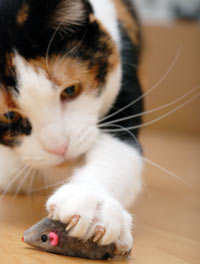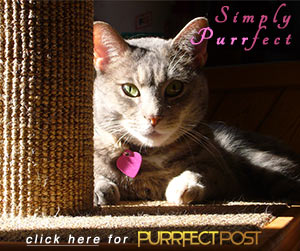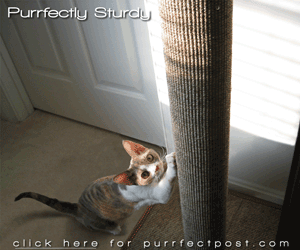Honeysuckle: An Alternative to Catnip

Many people who have cats enjoy watching them respond to catnip or catnip-stuffed toys. However, approximately one-third of cats have no reaction to catnip. Scientists believe this is genetic and may have to do with the place of origin of a cat's breed and whether catnip grew there. Luckily, many cats that don't respond to catnip do show a similar response to honeysuckle.
What Is Honeysuckle?
There are over 180 species of honeysuckle shrubs and vines, though only one species, Lonicera tatarica or tatarian honeysuckle, seems to have an effect on cats. And what a fun effect it can be! Cats that are stimulated by honeysuckle tend to exhibit the same uninhibited playfulness and antics as those that are under the influence of catnip.
Did you know? A honeysuckle tree, the wood of which is used to make honeysuckle toys for cats, takes 15 years to grow!
How Are Cats Affected By Honeysuckle?
Tatarian honeysuckle contains a chemical that is similar to the active ingredient in catnip. Most likely, it is this substance that puts cats into a delightful, temporarily altered state.
Although there have been no studies on the subject, anecdotes suggest that 85% or more of cats respond to honeysuckle, and many of those cats are ones that have no interest in catnip. Some cats are attracted to both. Whether cats respond to honeysuckle or not does not seem to depend on the same genetic code that determines whether cats respond to catnip.
Helpful Tip: Spraying a honeysuckle toy with water enhances its aroma and makes it more attractive to your cat.
The chemical, nepetalactone, which creates the response in cats to catnip, doesn't work until the cat is in puberty. However, this does not seem to be true of honeysuckle, which will often work in cats that are much younger than six months of age.
When compared to catnip, honeysuckle's aroma is stronger, so it may be more appealing to cats with an inhibited sense of smell.
Is Honeysuckle Safe for Cats?
There have been no reports of serious side effects in cats from honeysuckle toys and spray. However, some species of honeysuckle and the berries from honeysuckle plants may be toxic to cats. Ingesting honeysuckle wood or flowers may also cause gastrointestinal upset and the wood can cause choking or damage to the delicate tissues of the mouth. To be safe, only buy honeysuckle products from trusted vendors and only give your cat honeysuckle that is inside of a sturdy toy.
Also, for your own safety, it's best to give your cat some space when you are giving her honeysuckle for the first time. While there seems to be less of a tendency for cats to become aggressive from the effects of honeysuckle than from catnip, it's good to use caution until you see how your cat reacts. You can read more about this potential side effect here: "What Does Catnip Do to Cats: Why Do Cats Like Catnip?"
Toys We Love
Here are some honeysuckle toys for cats that we love:
- Honeysuckle Mouse: Give your cat some variety in her hunting experience. Add a honeysuckle mouse in with all her catnip mice for her to fling around and stalk. For even more fun variety, throw in a Honeysuckle Funky Mouse.
- Honeysuckle Body Pillow: Your cat will love body-pouncing these honeysuckle-stuffed body pillows. They can roll around, bunny-kick, chew, lick, and pounce, then cuddle up for a nice snooze. Comes in two sizes so both large and small cats can have the perfect pillow.
- Honeysuckle Cushion: These little cushions are the perfect size for your kitty to toss up in the air and bat around. With honeysuckle inside, the game will be even more interesting.
- Honeysuckle Play Mat: Your cat will love to settle in on her honeysuckle play mat to help you do paperwork, watch TV with you, or take an afternoon nap.
- Honeysuckle Spray: Use honeysuckle spray to draw your cat's attention to her scratching post or some abandoned toys.
You May Also Like These Articles:
What Does Catnip Do to Cats? Why Do Cats Like Catnip?
Feliway - A Useful Tool to Help Treat Stress in Cats
Why Do Cats Purr? The How & Why of Cat Purring
The Benefits of Having Multiple Cat Scratching Surfaces
How to Keep Playtime Fun for Your Cat
Interactive Playing with Wand Toys
Notice: Ask-a-Vet is an affiliated service for those who wish to speak with a veterinary professional about their pet's specific condition. Initially, a bot will ask questions to determine the general nature of your concern. Then, you will be transferred to a human. There is a charge for the service if you choose to connect to a veterinarian. Ask-a-Vet is not manned by the staff or owners of CatHealth.com, and the advice given should not delay or replace a visit to your veterinarian.





